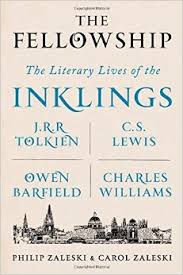Ricochet is the best place on the internet to discuss the issues of the day, either through commenting on posts or writing your own for our active and dynamic community in a fully moderated environment. In addition, the Ricochet Audio Network offers over 50 original podcasts with new episodes released every day.
 Fascinating Look at the Impact of The Inklings on Literature
Fascinating Look at the Impact of The Inklings on Literature
 “The Fellowship: The Literary Lives of the Inklings: J.R.R. Tolkien, C.S. Lewis, Owen Barfield, and Charles Williams,” by Philip Zaleski and Carol Zaleski, Farrar, Straus and Giroux, 2015, 656 pages, $35.00 (Hardcover)
“The Fellowship: The Literary Lives of the Inklings: J.R.R. Tolkien, C.S. Lewis, Owen Barfield, and Charles Williams,” by Philip Zaleski and Carol Zaleski, Farrar, Straus and Giroux, 2015, 656 pages, $35.00 (Hardcover)
The Inklings perhaps were the 20th century’s most influential literary circle. Three members, C.S. Lewis, J.R.R. Tolkien, and Charles Barfield legitimized fantasy as a literary genre, a field which has grown explosively over the last 40 years.
“The Fellowship: The Literary Lives of the Inklings: J.R.R. Tolkien, C.S. Lewis, Owen Barfield, and Charles Williams,” by husband and wife team Philip and Carol Zaleski, examines the men of the Inklings and their impact on literature.
The Inklings, a literary club which met regularly at Oxford, England was all male, Christian, and intellectual. Several were Oxford dons; all were writers. They met to encourage each other as writers.
The book follows the lives of the Inklings as well as their writings. The book looks at all of the Inklings, and even the women like Dorothy Sayers and Sister Penelope Lawson associated with the group. Its focus is sharpest on the four most influential Inklings: C.S. Lewis (best known for his Christian apologetics and the Narnia series), J.R.R. Tolkien (and his massive Middle Earth mythology), Charles Williams (who wrote supernatural shockers), and Owen Barfield (a philosopher who influenced novelist Saul Bellow).
It was a stellar combination of authors. Even members regarded today as minor members had impressive careers. Lewis’s older brother Warren, sometimes dismissed only as his brother’s shadow, was an acclaimed historian. He wrote seven impressive volumes about the court of Louis XIV.
There are many surprises. Lewis and Tolkien created the group, but Charles Williams, who joined late, provided a creative spark which seemed to have flickered out after his death in 1945. Great things followed, but something vanished with Williams. Individual Inklings pulled in different directions.
The Zaleskis trace the arc of the group, showing how it formed, the role Christianity played, the fruits of the collaboration, and the impact the members’ works had on the world.
They are shown as humans who always strove, but sometimes failed.
“The Fellowship” is a book which will delight readers of the Inklings’ books. It offers a fascinating view on a noteworthy constellation of authors.
This piece was originally published in the Daily News of Galveston County.
Published in Literature



I had pre-ordered this book months ago. It came in but has been sitting on my shelf since then. It’s time to start. Thanks for the reminder, Seawriter. This is the 2nd time in two days, this book has presented itself to my consciousness. I take that as a sign.
Glad to help AUMom.
Seawriter
A great review. I’ve been reading about this group off and on for years. I will get this book now.
I predict that some day people will be talking about Ricochet the same way: “Ricochet is a writers’ group from which some of the best writers of our times have come.” :)
Yeah, but how will they explain me, then?
Seawriter
Seawriter, model builder extraordinaire, sparker of ideas, and a pretty good writer.
I’d like to read this. Whenever we go to Oxford, we go visit the Eagle and Child and imagine the Inklings congregating there and talking about the books we love.
You mention Charles Barfield in an early paragraph, possibly referring to Charles Williams (whom you refer to later), the latter being the author of a book on my shelf, War In Heaven; certainly a work of fantasy.
Way back in the dim 1980s, before the left had completely captured our universities, I took a class named The Oxford Mythmakers, as a humanities alternative. What a great course, studying this seminal group. Can you imagine being allowed to study these folks at a modern, public university, and getting credit?
They were all at Oxford, then, but as Merina notes, where they met was in a pub! I imagine the fantasy-genre they employed was not favored by their more “serious” colleagues on campus. They employed fantasy to reach the masses with their messages regarding the decline of Western civilization, in particular Christianity. Civilization and the church have mostly proved impervious to the warnings of The Inklings.
To start — as the welcome provider of pithy book reviews.